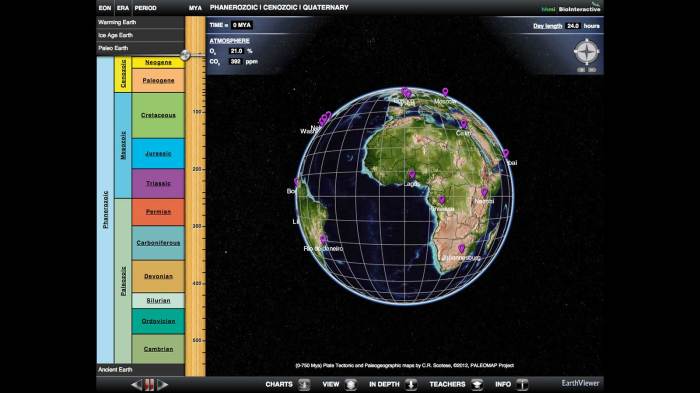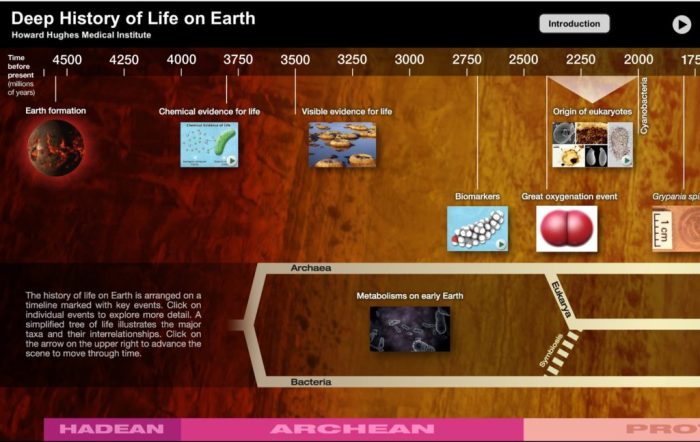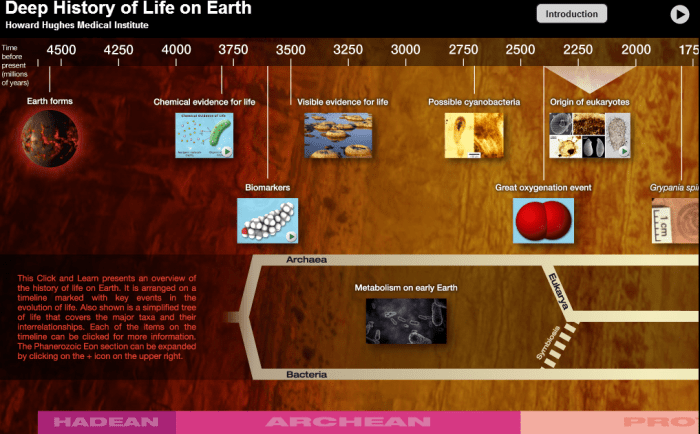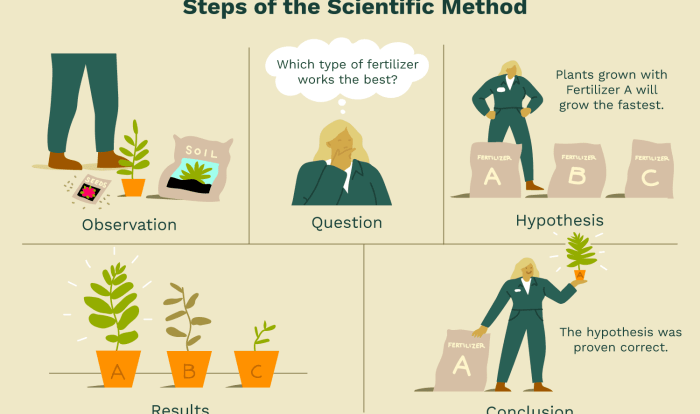Hhmi deep history of life on earth – HHMI’s Deep History of Life on Earth unveils the captivating narrative of our planet’s biological evolution, offering profound insights into the origins and trajectory of life itself. This comprehensive exploration traces the major milestones and transformative events that have shaped the history of life, revealing the intricate interplay between geological and biological processes that have molded our planet’s rich tapestry of biodiversity.
The concept of “deep history” serves as a guiding principle in this endeavor, enabling us to delve beyond the limitations of recorded history and explore the vast expanse of time that has preceded human civilization. Through meticulous research and innovative methodologies, scientists have pieced together a remarkable chronicle of life’s journey, extending our understanding far beyond the relatively recent era of human existence.
History of Life on Earth
Life on Earth has a long and complex history that spans billions of years. The earliest evidence of life dates back to around 3.5 billion years ago, and since then, life has evolved and diversified into the incredible array of organisms we see today.
The history of life on Earth can be divided into several major eras, each characterized by its own unique set of environmental conditions and dominant life forms.
Major Events and Milestones in the Evolution of Life
- Origin of Life:Around 3.5 billion years ago, the first self-replicating molecules emerged from a prebiotic soup of organic molecules.
- Great Oxidation Event:Around 2.4 billion years ago, the atmosphere of Earth became oxygenated, leading to the evolution of aerobic organisms.
- Cambrian Explosion:Around 540 million years ago, there was a sudden and dramatic increase in the diversity of life forms, known as the Cambrian Explosion.
- Mass Extinctions:Throughout Earth’s history, there have been several mass extinctions that have wiped out large numbers of species, including the extinction of the dinosaurs 65 million years ago.
- Rise of Humans:Around 200,000 years ago, the first modern humans evolved in Africa and began to spread throughout the world.
Deep History of Life on Earth: Hhmi Deep History Of Life On Earth

The deep history of life on Earth refers to the study of life’s origins and evolution over billions of years. This field of study is important for understanding the diversity and complexity of life on Earth today, as well as the processes that have shaped the planet’s history.
Challenges and Methods Used to Study Deep History, Hhmi deep history of life on earth
Studying the deep history of life is challenging because the evidence is often fragmentary and difficult to interpret. However, scientists use a variety of methods to study deep history, including:
- Paleontology:The study of fossils provides direct evidence of past life forms.
- Geochemistry:The study of rocks and minerals can provide information about the environmental conditions in which life evolved.
- Molecular biology:The study of DNA and RNA can provide insights into the evolutionary relationships between different organisms.
Discoveries and Insights Gained from Studying the Deep History of Life
The study of deep history has led to a number of important discoveries and insights, including:
- The realization that life on Earth is much older than previously thought.
- The identification of the major events and milestones in the evolution of life.
- A better understanding of the processes that have shaped the diversity and complexity of life on Earth.
Howard Hughes Medical Institute (HHMI) Contributions

HHMI is a non-profit medical research organization that has been a major supporter of research on the deep history of life.
Major Projects and Discoveries Made by HHMI Researchers
- The Deep Carbon Observatory:A global research project that is studying the role of carbon in the deep Earth and its implications for life.
- The Simons Collaboration on the Origins of Life:A research collaboration that is investigating the origins of life on Earth.
- The HHMI Janelia Research Campus:A research center that is dedicated to studying the brain and nervous system, including the evolution of these systems.
Impact of HHMI’s Contributions on Our Understanding of the History of Life
HHMI’s research on the deep history of life has had a major impact on our understanding of the origins and evolution of life on Earth. HHMI-funded research has helped to:
- Identify new evidence for the earliest forms of life.
- Develop new methods for studying the deep history of life.
- Train a new generation of scientists who are studying the deep history of life.
Significance and Implications

Understanding the deep history of life is important for a number of reasons.
Significance of Understanding the Deep History of Life
- It helps us to understand the origins and evolution of life on Earth.
- It provides insights into the processes that have shaped the diversity and complexity of life on Earth.
- It can help us to predict how life on Earth may evolve in the future.
Implications of Deep History Research for Fields such as Biology, Geology, and Paleontology
Research on the deep history of life has implications for a number of fields, including:
- Biology:Deep history research can help us to understand the evolution of biological systems, including the origins of new species and the extinction of others.
- Geology:Deep history research can help us to understand the geological processes that have shaped the Earth’s surface and atmosphere.
- Paleontology:Deep history research can help us to identify new fossils and to learn more about the evolution of past life forms.
Quick FAQs
What is the significance of studying the deep history of life?
Understanding the deep history of life provides invaluable insights into the origins and evolution of life on Earth, shaping our comprehension of the present state of our planet’s ecosystems and the challenges they face.
How does HHMI contribute to the study of deep history?
HHMI supports groundbreaking research initiatives that utilize innovative methodologies to explore the deep history of life, expanding our knowledge of the major events and milestones that have shaped the evolution of life on Earth.
What are the implications of deep history research for other fields?
Deep history research has profound implications for fields such as biology, geology, and paleontology, providing a comprehensive framework for understanding the interconnectedness of life’s evolution with the Earth’s geological and environmental processes.

